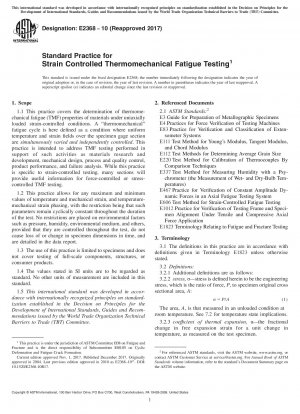ASTM E2368-10(2017)
Standard Practice for Strain Controlled Thermomechanical Fatigue Testing
- Standard No.
- ASTM E2368-10(2017)
- Release Date
- 2010
- Published By
- American Society for Testing and Materials (ASTM)
- Latest
- ASTM E2368-10(2017)
- Scope
-
4.1 In the utilization of structural materials in elevated temperature environments, components that are susceptible to fatigue damage may experience some form of simultaneously varying thermal and mechanical forces throughout a given cycle. These conditions are often of critical concern because they combine temperature dependent and cycle dependent (fatigue) damage mechanisms with varying severity relating to the phase relationship between cyclic temperature and cyclic mechanical strain. Such effects can be found to influence the evolution of microstructure, micromechanisms of degradation, and a variety of other phenomenological processes that ultimately affect cyclic life. The strain-controlled thermomechanical fatigue test is often used to investigate the effects of simultaneously varying thermal and mechanical loadings under idealized conditions, where cyclic theoretically uniform temperature and strain fields are externally imposed and controlled throughout the gage section of the specimen.
1.1 This practice covers the determination of thermomechanical fatigue (TMF) properties of materials under uniaxially loaded strain-controlled conditions. A “thermomechanical” fatigue cycle is here defined as a condition where uniform temperature and strain fields over the specimen gage section are simultaneously varied and independently controlled. This practice is intended to address TMF testing performed in support of such activities as materials research and development, mechanical design, process and quality control, product performance, and failure analysis. While this practice is specific to strain-controlled testing, many sections will provide useful information for force-controlled or stress-controlled TMF testing.
1.2 This practice allows for any maximum and minimum values of temperature and mechanical strain, and temperature-mechanical strain phasing, with the restriction being that such parameters remain cyclically constant throughout the duration of the test. No restrictions are placed on environmental factors such as pressure, humidity, environmental medium, and others, provided that they are controlled throughout the test, do not cause loss of or change in specimen dimensions in time, and are detailed in the data report.
1.3 The use of this practice is limited to specimens and does not cover testing of full-scale components, structures, or consumer products.
1.4 The values stated in SI units are to be regarded as standard. No other units of measurement are included in this standard.
1.5 This international standard was developed in accordance with internationally recognized principles on standardization established in the Decision on Principles for the Development of International Standards, Guides and Recommendations issued by the World Trade Organization Technical Barriers to Trade (TBT) Committee.
ASTM E2368-10(2017) Referenced Document
- ASTM E1012 Standard Practice for Verification of Specimen Alignment Under Tensile Loading
- ASTM E111 Standard Test Method for Young''s Modulus, Tangent Modulus, and Chord Modulus
- ASTM E112 Standard Test Methods for Determining Average Grain Size
- ASTM E1823 Standard Terminology Relating to Fatigue and Fracture Testing
- ASTM E220 Standard Test Method for Calibration of Thermocouples By Comparison Techniques
- ASTM E3 Standard Practice for Preparation of Metallographic Specimens
- ASTM E337 Standard Test Method for Measuring Humidity with a Psychrometer (the Measurement of Wet- and Dry-Bulb Temperatures)
- ASTM E4 Standard Practices for Force Verification of Testing Machines
- ASTM E467 Standard Practice for Verification of Constant Amplitude Dynamic Forces in an Axial Fatigue Testing System
- ASTM E606 Standard Practice for Strain-Controlled Fatigue Testing
- ASTM E83 Standard Practice for Verification and Classification of Extensometer
ASTM E2368-10(2017) history
- 2010 ASTM E2368-10(2017) Standard Practice for Strain Controlled Thermomechanical Fatigue Testing
- 2010 ASTM E2368-10 Standard Practice for Strain Controlled Thermomechanical Fatigue Testing
- 2004 ASTM E2368-04e1 Standard Practice for Strain Controlled Thermomechanical Fatigue Testing
- 2004 ASTM E2368-04 Standard Practice for Strain Controlled Thermomechanical Fatigue Testing
